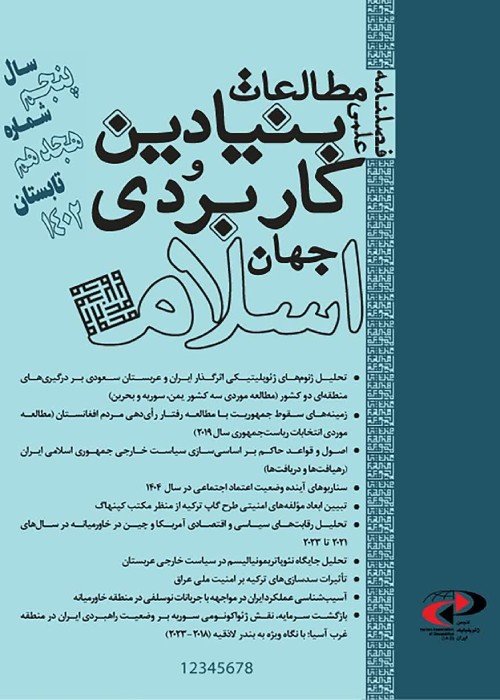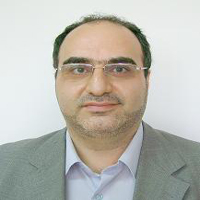Islamic Republic of Iran s The policy towards the GCC countries
The Middle East is one of the most important, sensitive and complex regions in the world. What makes this region stand out in all its dimensions and areas is its unique political, economic, cultural-social, geographical and geopolitical features. These conditions have somehow overshadowed the structural equations of the region under the dialectical influence of the interaction of political, economic, cultural-social and security components and power in relation to other actors in the region, so that the increase of cooperation of these governments in this interaction space, eventually led to the formation of an organization called the Persian Gulf Cooperation Council in 1981 in the Persian Gulf regional system. The Persian Gulf Cooperation Council is one of the most important regional organizations in the regional environment of Iran, and Iran's policies have always played an important role in the orientations and goals of the council. In this regard, the members of the Council considered the developments in the Middle East, especially the establishment of a democratic and Shiite government in Iraq and the developments of the Islamic Awakening as a shift in the balance of power in favor of Iran and increasing power and influence in the regions of Iran. Movements in the regions of Iran see their lives and survival in danger. This has caused them to use all their facilities and tools to counter the growing power of the regions of Iran. Understanding the real tensions between Iran and the Saudi-led PGCC countries along the Shiite-Sunni lines in the PGCC has been shaped most regionally and internationally. These differences also undermine Iran's efforts to improve relations with council governments in recent years. Since Hassan Rouhani came to power, he has repeatedly proposed peace initiatives for Saudi-led PGCC member states. Not only has this pragmatic policy not been very successful, but Iran-Saudi Arabia relations have become much colder than before. Relations between Iran and the Persian Gulf Cooperation Council have worsened since the Barjam nuclear deal. Iran's regional expansion and the siege of Qatar, while changing the power structure in the Persian Gulf region, created more tension and insecurity in the region and increased the scope of confrontation between Iran and Saudi Arabia, especially after Trump's unilateral withdrawal from the UN Security Council and the announcement of "maximum pressure policy." He turned against Iran. Although several smaller Gulf states have taken a more balanced approach to their relations with Iran, the main policy of the council is by Saudi Arabia with a new configuration of Middle East policy that sees a rare tripartite convergence of interests was regulated against Iran between Saudi Arabia and Israel. and the United States under Trump. According to the actions of the Cooperation Council and foreign interventionist powers, Iran's policy towards the Persian Gulf Cooperation Council is mainly based on three considerations: First, it hopes to turn enemies into friends, improves Iran's isolated position, and resolves the security-geopolitical dilemma in the Persian Gulf region. Second, Tehran's goal is to develop trade relations with its Persian Gulf neighbors and promote Iran's economic development, and third, to cooperate with Iran to reduce US influence in the Persian Gulf and weaken its hostility to Iran. Therefore, this article uses a method of analytical research to review the regional and international policies of the Islamic Republic of Iran from a historical perspective to explain the relations with the neighbors of the Cooperation Council in the post-Iran-Iraq period. The question that arises is what has been the main component and axis of Iran's policy after the Holy Defense, especially during the presidency of Mr. Rouhani towards the PGCC? . This study shows that during Mr. Rouhani's administration, improving relations with the PGCC has been the main focus of Iran's efforts to improve security in the Persian Gulf region. However, a number of structural obstacles, historical distrust, and Iran's movements in the region have severely hostile Tehran's relations with the Cooperation Council and have further increased insecurity in the region as Iran's growing influence in the Arab region coincides with its anti-hegemonic policy. This means that Iran's peace initiatives with the Cooperation Council have faced major obstacles, and Iran's success in reducing tensions and promoting peace plans with the PGCC has not been useful.
Iran , PGCC , Saudi Arabia , USA , Regional security
- حق عضویت دریافتی صرف حمایت از نشریات عضو و نگهداری، تکمیل و توسعه مگیران میشود.
- پرداخت حق اشتراک و دانلود مقالات اجازه بازنشر آن در سایر رسانههای چاپی و دیجیتال را به کاربر نمیدهد.




